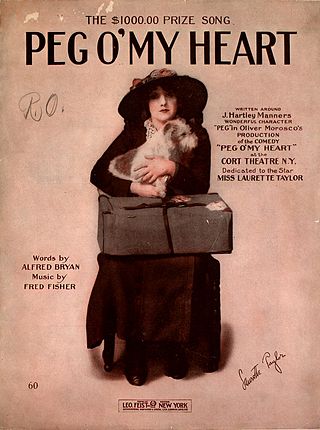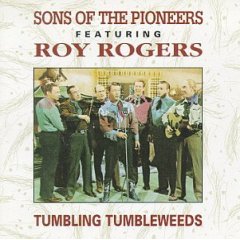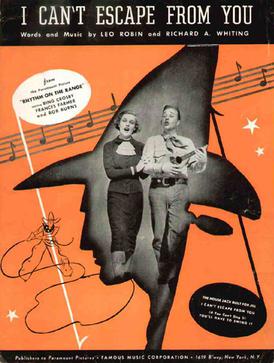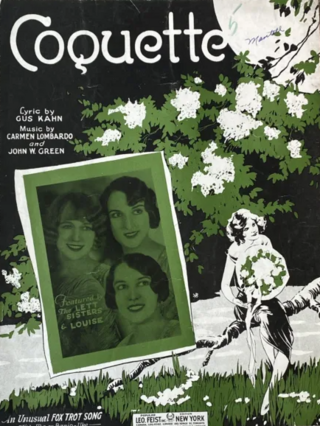Related Research Articles

"Peg o' My Heart" is a popular song written by Alfred Bryan (words) and Fred Fisher (music). It was published on March 15, 1913 and it featured in the 1913 musical Ziegfeld Follies.
"Can Anyone Explain? " is a popular song written by Bennie Benjamin and George David Weiss and published in 1950.

"The Yellow Rose of Texas" is a traditional American song dating back to at least the 1850s. Members of the Western Writers of America chose it as one of the Top 100 Western songs of all time. Many versions of the song have been recorded, the most popular of which was by Mitch Miller, whose version reached No. 1 in the United States in 1955. Its popularity made it an unofficial state song of Texas.

"Back in Your Own Backyard" is a popular song. Officially the credits show it as written by Al Jolson, Billy Rose, and Dave Dreyer; in fact, Billy Rose was exclusively a lyricist, Dreyer a composer, and Al Jolson a performer who was often given credits so he could earn some more money, so the actual apportionment of the credits would be likely to be music by Dreyer, lyrics by Rose, and possibly some small contribution by Jolson.
"Thinking of You" is a popular song, composed by Harry Ruby with lyrics by Bert Kalmar. It was introduced in the Broadway show, The Five O'Clock Girl (1927) when it was sung by Mary Eaton and Oscar Shaw.
"My Dreams Are Getting Better All the Time" is a 1945 popular song.
"The One I Love (Belongs to Somebody Else)" is a popular song composed by Isham Jones with lyrics by Gus Kahn. The song was recorded by Isham Jones' Orchestra on December 21, 1923, at Brunswick Studios in New York City, and published on January 7, 1924. On January 17 in Chicago, Jones recorded another version, with Al Jolson on lead vocals. Both versions made the charts that Spring, with Jolson's peaking at number 2, and Jones' at number 5. Sophie Tucker recorded her version February 1924, released on Okeh 40054.

"Somebody Loves Me" is a popular song, with music written by George Gershwin, and lyrics by Ballard MacDonald and Buddy DeSylva. The song was published in 1924 and featured in George White's Scandals of 1924.
"I Was Doing All Right" is a song composed by George Gershwin, with lyrics by Ira Gershwin. It was introduced by Ella Logan in the 1937 film The Goldwyn Follies.
"Trust in Me" is a song written by Ned Wever, Milton Ager, and Jean Schwartz. Popular versions in 1937 were by Mildred Bailey and by Wayne King & his Orchestra.
"Flamingo" (1940) is a popular song and jazz standard written by Ted Grouya with lyrics by Edmund Anderson and first recorded by singer Herb Jeffries and the Duke Ellington Orchestra on December 28, 1940, for Victor Records. This briefly reached the Billboard charts in 1941.

"Tumbling Tumbleweeds" is a Western music song composed by Bob Nolan, a founding member of the Sons of the Pioneers. Nolan wrote the song in the early 1930s while he was working as a caddy and living in Los Angeles. It was first recorded by the Sons of the Pioneers in 1934, and it became one of the most famous songs associated with the group. Originally titled "Tumbling Leaves", the song was reworked into the title "Tumbling Tumbleweeds" and into more widespread fame with the 1935 film of the same name starring Gene Autry. Members of the Western Writers of America chose it as one of the Top 100 Western songs of all time.

"Runnin' Wild" is a popular song first composed and recorded in 1922, written by Arthur Harrington Gibbs with lyrics by Joe Grey and Leo Wood.
Liza (All the Clouds'll Roll Away)" is a song composed by George Gershwin with lyrics by Ira Gershwin and Gus Kahn. It was introduced in 1929 by Ruby Keeler (as Dixie Dugan) in Florenz Ziegfeld's musical Show Girl. The stage performances were accompanied by the Duke Ellington Orchestra. On the show's opening night in Boston on June 25, 1929, Keeler's husband and popular singer Al Jolson suddenly stood up from his seat in the third row and sang a chorus of the song, much to the surprise of the audience and Gershwin himself. Jolson recorded the song a few days later on July 6, 1929, and his rendition rose to number nine on the charts of the day.
Blue and Sentimental is a song written by Count Basie, Jerry Livingston, and Mack David. It was written in 1938 and recorded by the Count Basie Orchestra on 6 June that year.
"For You" is a song written by Joe Burke and Al Dubin in 1930. It was introduced in the Mack Sennett short Billboard Girl (1932) when it was sung by Bing Crosby. The best known version was from musician Rick Nelson in 1964, when it peaked at #6 on the Billboard Hot 100 and at #66 on the year end.

"I Can't Escape from You" is a song written music by Richard A. Whiting and lyrics by Leo Robin for the 1936 Paramount Film "Rhythm on the Range", and first introduced in the film when Bing Crosby sang it to Frances Farmer. Crosby recorded it for Decca Records that same year with the Jimmy Dorsey Orchestra and it was in the hit parade for 11 weeks reaching a peak position of No. 7. Crosby recorded the song again in 1954 for his album Bing: A Musical Autobiography.

"Coquette" is a 1928 fox trot jazz standard. It was composed by Johnny Green and Carmen Lombardo, with lyrics by Gus Kahn. Guy Lombardo had great success with the song in 1928.

"Elmer's Tune" is a 1941 big band and jazz standard written by Elmer Albrecht, Dick Jurgens and Sammy Gallop. Glenn Miller and his Orchestra and Dick Jurgens and his Orchestra both charted with recordings of the composition.
"The Lamplighter's Serenade" is a song written by Hoagy Carmichael (music) and Paul Francis Webster (lyrics). The construction of the song was unusual and did not conform to the normal AABA pattern. Instead, Carmichael used an ABA format that proved most effective.
References
- ↑ 78 Record: Ted Weems - Deep In The Heart Of Texas (1942) , retrieved 2021-07-19
- ↑ 78 Record: Ted Weems - Deep In The Heart Of Texas (1942) , retrieved 2021-07-19
- ↑ Ted Weems And His Orchestra; Perry Como; Don Swander; June Hershey (1941-12-09), Deep in the Heart of Texas, Internet Archive, Decca, retrieved 2021-07-19
- ↑ Smith, Kathleen E.R. (28 March 2003). God Bless America: Tin Pan Alley Goes to War. The University Press of Kentucky. p. 25. ISBN 0-8131-2256-2.
- ↑ "THE ONLINE DISCOGRAPHICAL PROJECT". 78discography.com. Retrieved June 21, 2017.
- 1 2 3 4 5 Whitburn, Joel (1986). Joel Whitburn's Pop Memories 1890-1954 . Wisconsin, USA: Record Research Inc. p. 491. ISBN 0-89820-083-0.
- ↑ "Perry Como Discography". kokomo.ca. Archived from the original on August 26, 2017. Retrieved June 21, 2017.
- ↑ "THE ONLINE DISCOGRAPHICAL PROJECT". 78discography.com. Retrieved June 21, 2017.
- ↑ "A Bing Crosby Discography". BING magazine. International Club Crosby. Retrieved June 21, 2017.
- ↑ Orodenker, M.H. (February 28, 1942). "On the Records". Billboard. p. 25.
- 1 2 "Pop Chronicles 1940s Program #6". 1972.
- ↑ "THE ONLINE DISCOGRAPHICAL PROJECT". 78discography.com. Retrieved June 21, 2017.
- ↑ Orodenker, M.H. (March 7, 1942). "On the Records". Billboard. p. 21.
- ↑ "THE ONLINE DISCOGRAPHICAL PROJECT". 78discography.com. Retrieved June 21, 2017.
- ↑ "Discogs.com". Discogs.com. Retrieved June 21, 2017.
- ↑ Hem till vår ranch i Texas at Swedish Media Database .
- ↑ "Discogs.com". Discogs.com. Retrieved June 21, 2017.
- ↑ "allmusic.com". allmusic.com. Retrieved June 21, 2017.
- ↑ "Internet Movie Database". imdb.com. Retrieved June 21, 2017.
- ↑ "Pee-wee Rocks". Entertainment Weekly .
- ↑ "Whip It (Film)".
- ↑ Pentis, Andrew (16 August 2012). "Stadium Songs-Houston Astros". ESPN.com. Retrieved 30 May 2015.
- ↑ French, Philip (August 9, 2008). "The golden age of BBC censorship; Ex-radio producer Philip French recalls Auntie's strangest strictures". The Guardian. Retrieved August 5, 2012.